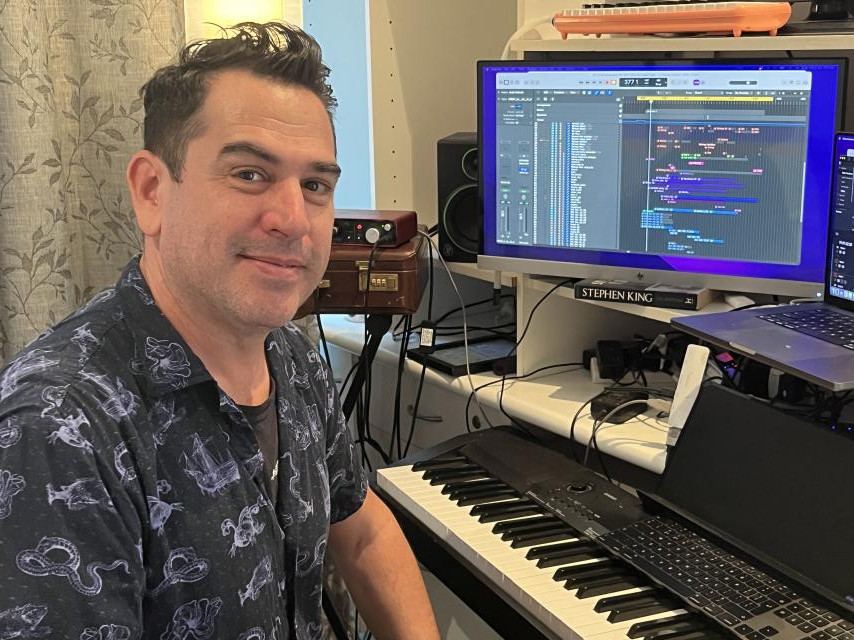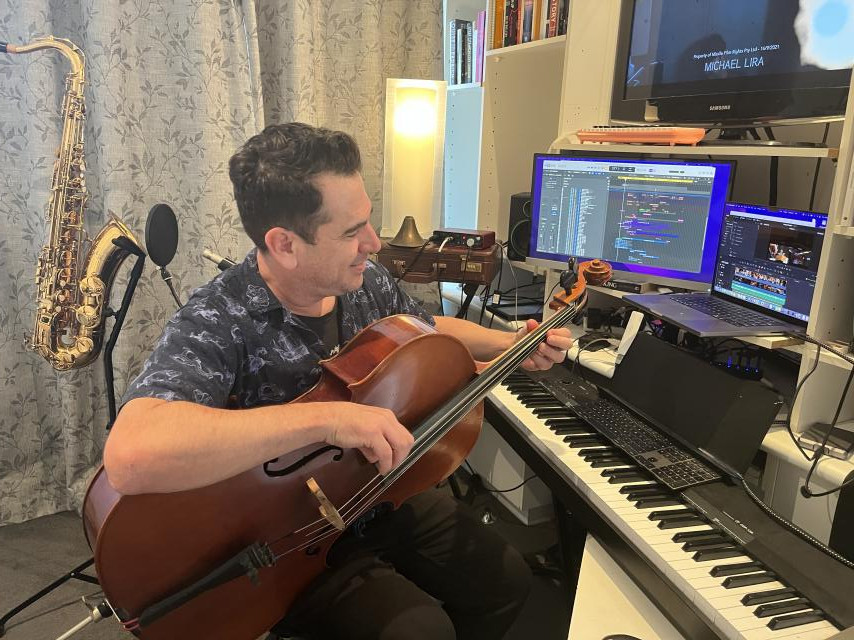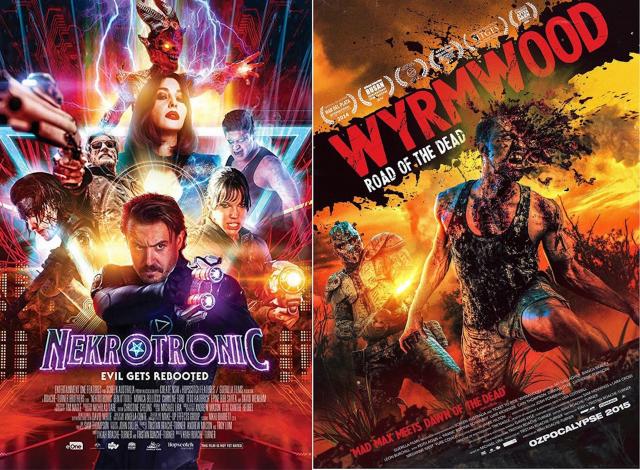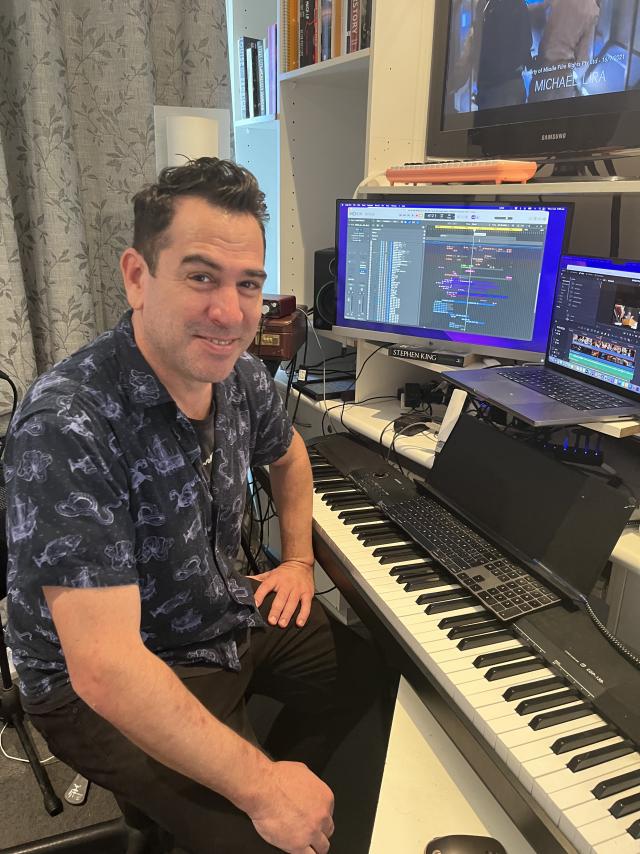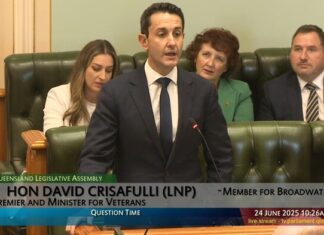If you see Mike Lira doing his morning walk along the Gympie Terrace riverfront, busily talking into a phone-piece, please don’t interrupt him. He’s probably sealing the deal for his next film score with a famous Hollywood director.
“I love the pace of life in Noosa,” the Sydney-born musician and composer, who pre-Covid had spent his recent working life flitting between New York and Los Angeles, said, “and the fact that the time zones mean I can do my LA calls while I take my one-hour walk every morning.”
That was exactly how the dramatic and energetic score for the latest Netflix action thriller Interceptor, released last week, was composed last year, with Mike discussing its progress every morning with writer/director Matthew Reilly as he paraded past the pelicans.
If you’ve seen the graphic and somewhat blood-spattered film you might find it difficult to relate that peaceful image to the loud, percussive and dramatic music of the score, but welcome to the modern world of film production.
After being bi-coastal for a few years, with Mike based on the west coast for his film work and partner Rachel Crawford working in New York as a literary agent, the couple decided to escape the pressures of city life (soon after a shooting at Mike’s local supermarket in East LA) and try working remotely while paying an extended visit with Rach’s family in Tewantin.
Then Covid hit and that extended visit became a little longer than anticipated.
“We decided to sit it out here in Noosa,” Mike said.
“Rach found an apartment to rent on Gympie Terrace and here we are! We don’t know how long we’ll be here, but it’s a great base for both of us, even with travel coming back on the agenda more regularly.”
The two-bedroom apartment with river views may be a rather cluttered workspace, with Rach taking over a corner of the living room and Mike’s studio jammed into the second bedroom upstairs, but it suits this hard-working couple fine. And as a former member of punk rock bands, Mike, now 47, knows how to work rough and produce smooth results.
“I always loved music from a very early age, had my first band when I was 14 called Anorexic Elephant. We didn’t do many shows, but it was a start. I’d also always loved film scores and cartoon music.
“I grew up paying attention to the music behind the action, and I loved really dramatic music. I felt that writing film scores was something I could do, but I had no idea of the practical steps required. “And I was paying the rent and having fun playing with bands.”
His first grown-up band was called Vicious Hairy Mary.
“It started out as a punk band but it got stranger and stranger,” Mike said.
“I screamed through a megaphone.”
This was followed by Darth Vegas, but concurrently Mike began playing double bass with Monsieur Camembert, the gypsy-flavoured world music sensations where he would have his biggest live music success.
“The music I played with them was very dramatic, with violin showpieces and Eastern European influences which I guess was leading me towards the kind of music I use in scores today.”
The breakthrough into film scores came with an animated series called Staines Down Drains.
“It was wall to wall crazy music, so it meant I was making the same kind of crazy music I made anyway, but getting paid for a change.”
This resulted in the first of many APRA awards for best television theme, and also led him to work on a series called Bogan Pride, a vehicle for a new comic actor called Rebel Wilson.
“It was highly ambitious for its budget. Every episode had two musical numbers, and Rebel wrote all the lyrics and we went right over the top with the music.”
Bogan Pride led Rebel Wilson to the US for Pitch Perfect, and the rest is history, but it also produced another break for Mike when Rebel wrote him a glowing reference for his American working visa.
Chasing the work wherever it took him, Mike found himself in demand to compose scores for hit TV series like Rake and The Slap, but he also got led into the slightly weirder world of cult zombie and horror films like 2020 releases Nekrotronic and Wyrmwood.
“These films are not mainstream, although Wyrmwood did well in the horror cult area. People in Texas loved it! I loved it, but to be honest I’m drawn to wild and crazy and surprising music.”
The Netflix production of Interceptor is his biggest budget job to date. Mostly filmed in Sydney with Chris Hemsworth as an executive producer (and playing a shop assistant in a hilarious cameo), his wife Elsa Pataky the star, and best-selling thriller author Matthew Reilly directing for the first time, it is a slickly-packaged hour and a half of formula blood and gore, with Pataky bouncing back from a me-too disaster to singlehandedly save the world from a nuclear holocaust.
Like all of Reilly’s embossed paperbacks, it’s sure to sell like stink.
Mike had met Matt around the traps in LA and when the author handed him a script and asked him to compose the score for a film he would direct, he was all in.
“Matt likes to say he’s not about fine dining, he’s here for the Mars Bars, and people love Mars Bars. He’s not after Oscars, he wants people to have a thrilling ride,” Mike said.
And that he delivers, although I have to confess my favourite parts were when I closed my eyes and absorbed just the music and effects, which are extraordinary.
“My mum says it’s my best work, and it might be,” Mike said.
Finishing a beer in the Sunset Bar at The Boathouse, Mike reflected that it sometimes gets lonely working remotely.
“It gets difficult to socialise when you’re working long hours with other time zones. And it’s fun to actually be in the studio where you can compose a piece of music and the director will drop by in the afternoon and listen, and then discuss it over dinner.
“I’ve often worked remotely although some projects insist that you’re local and available. But since Covid, people are so accommodating, and with internet speed and new technology it’s super easy.
“Yesterday we did a spotting session for a new film where the director, producers and music supervisor and sound team were all in different locations, LA, Sydney and Noosa.
“We watched the whole film start to finish and talked about every moment of sound and music. “Now I’ll go through it systematically and compose bits and send digital mockups with virtual sound married to the pictures. The director will review them, we’ll have a chat, and then I’ll either make changes or move onto the next section.
“It’s a good way to work, but it’s also nice to sit down and talk face to face, particularly over a beer. Haven’t done this in ages. Cheers!”

